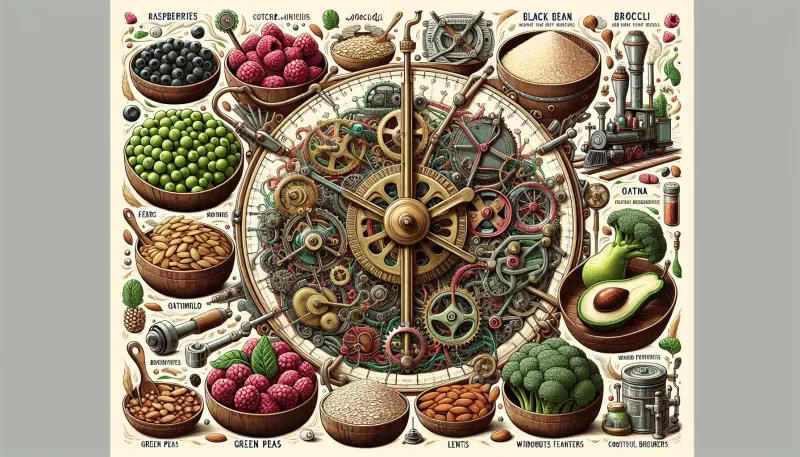Top 10 Fiber-Rich Foods for Seniors to Boost Digestive Health

Discover the best fiber-rich foods for seniors to help improve digestive health. Learn about top sources of dietary fiber and their benefits.
As we age, maintaining a healthy digestive system becomes increasingly important. One of the best ways to ensure optimal digestive health is by incorporating fiber-rich foods into our diet. Dietary fiber is crucial for promoting regular bowel movements, preventing constipation, and supporting overall gastrointestinal well-being. In this article, we will explore the top 10 fiber-rich foods for seniors, their specific benefits, and how they can be included in a balanced diet.
Why Fiber is Important for Seniors
Fiber is an essential component of a healthy diet, especially for seniors. It helps to keep the digestive system functioning smoothly by adding bulk to stools and facilitating their passage through the intestines. Additionally, a high-fiber diet can aid in controlling blood sugar levels, reducing cholesterol, and managing a healthy weight. For seniors, adequate fiber intake can also help mitigate the risk of diverticulitis and other digestive disorders.
Top 10 Fiber-Rich Foods for Seniors
1. Oats
Oats are a versatile and healthy grain that can be easily incorporated into breakfast or baked goods. They are rich in both soluble and insoluble fiber, which assist in lowering cholesterol levels and promoting heart health. Additionally, oats have a low glycemic index, making them a great option for seniors managing diabetes.
2. Beans and Legumes
Beans and legumes, such as black beans, lentils, and chickpeas, are excellent sources of dietary fiber. They provide a great mix of soluble and insoluble fiber, which can help regulate bowel movements and improve digestion. Furthermore, they are packed with protein, making them a fantastic meat substitute for seniors aiming to reduce their red meat intake.
3. Berries
Berries, including strawberries, blueberries, and raspberries, are not only delicious but also packed with fiber and antioxidants. They can help support overall digestive health and reduce inflammation. Berries can be enjoyed fresh, added to yogurt or smoothies, or used in desserts.
4. Apples
An apple a day can indeed keep the digestive issues away. Apples contain a type of soluble fiber called pectin, which can help bulk up stools and promote regular bowel movements. They are easy to snack on, can be added to salads, or enjoyed as part of savory dishes.
5. Whole Grains
Whole grains, such as brown rice, barley, and whole wheat, are integral to a fiber-rich diet. Unlike refined grains, whole grains retain their bran and germ, which provide essential nutrients and fiber. Regular consumption of whole grains may help lower the risk of chronic diseases and improve digestive health.
6. Nuts and Seeds
Nuts and seeds, like almonds, chia seeds, and flaxseeds, are small but mighty when it comes to fiber content. They can be easily incorporated into various meals, from breakfast cereals and salads to baked goods. Aside from fiber, they offer healthy fats and protein, making them a nutritious addition to any diet.
7. Broccoli
Broccoli is a cruciferous vegetable that is high in fiber and promotes digestive health. It contains a unique type of fiber that feeds the good bacteria in the gut, thereby enhancing gut health. Broccoli can be steamed, roasted, or added to soups and casseroles.
8. Avocados
Avocados are not only a great source of healthy fats but also high in fiber. They can help improve bowel regularity and prevent constipation. Avocados can be enjoyed in salads, as a spread on toast, or added to various dishes for extra creaminess.
9. Sweet Potatoes
Sweet potatoes are nutritious root vegetables that offer a good amount of dietary fiber. They are also rich in vitamins and antioxidants. Sweet potatoes can be baked, roasted, or mashed as a healthy side dish.
10. Leafy Greens
Leafy greens such as spinach, kale, and Swiss chard are excellent sources of fiber. They are also packed with vitamins, minerals, and antioxidants. Incorporating leafy greens into meals can improve overall dietary fiber intake and support digestive health.
Conclusion
Incorporating fiber-rich foods into the diet is essential for seniors to maintain a healthy digestive system. Foods like oats, beans, berries, apples, and whole grains offer numerous health benefits that extend beyond digestion. Making a conscious effort to include these foods in daily meals can lead to improved digestive health, better regulation of blood sugar levels, and overall well-being.
Seniors should aim for an intake of 25 to 30 grams of fiber daily, and ensuring a diverse diet rich in fruits, vegetables, whole grains, nuts, and seeds can help meet these needs. Remember to increase fiber intake gradually and drink plenty of water to aid in the digestion of fiber-rich foods. By making these dietary changes, seniors can enjoy enhanced digestive health and improved quality of life.



























